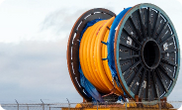Hook-up Wire: Understanding the Variety Part 1

Hook-up wire, also known as hook cable or lead wire, is a specific type of a single insulated electrical cable designed for low-voltage applications in electronic tools' internal wiring. Possible applications include computers, home and office appliances, transformers, motors of different sizes, circuits, control panels, and automotive tools. There are plenty of hook up wires on the market with varying types of insulation, voltage, and conductor materials. In most cases, your choice would depend on the environment the hook-up wire will be exposed to and the temperatures it would have to endure.
What unites all of them is that they have a single insulated conductor designed exclusively for internal applications. In the majority of cases, the conductor is made of tinned copper. Since it is relatively easy to get lost in dozens of available hook-up wire types, let us guide you through some of the kinds of hook cables sold by Nassau National Cable.
Hook Up Lead Wire AWM UL 3340-3374 is designed for internal wiring when exposed to high temperatures. It serves well in conditions where there is a probability of an explosion. The voltage rating of this particular type of hook-up wire is 600 volts. According to UL 758, the cable's temperature range is 125°C for flexing applications and 150°C for non-flexing applications. The cable has a flexible tinned copper conductor and an EPDM insulation that is strong and flexible at the same time.
Hook Up Wire UL 1061 is an electrical wire with a lower temperature rating of 80°C. With a voltage rating of 300 volts, this wire is meant for lower voltage applications. It is commonly used in appliance wirings, motor engines, oils and coolant power lines, and transformers. The cable has a tinned copper conductor and a PVC insulation.
Hook-Up Tinned Copper FEP TYPE K MIL-W-16878/11 High-Temperature Wire is designed to be used mainly in military cable harnessing. The cable is also suitable for power plants because it can withstand quite a severe influence of acids, oils, and high temperatures. It has an extruded FEP insulation. The key characteristic of a Fluorinated Ethylene Propylene insulation is that it has excellent resistance to chemicals. The cable can withstand the temperature of 150°C. The voltage rating is 600 volts.
Hook Up Lead Wire UL 1007/1569 MIL-W-16878 is another type of hook-up wire meant for military applications. Compared to its analogue described above, this cable has a lower voltage rating of 300 volts and a lower temperature range at 105°C, meaning it is not suitable for high-temperature applications. The cable is equipped with a black PVC jacket that protects it from abrasion and mechanical damage.
Hook Up Lead Wire E-Beam is a hook-up wire with an XLPE insulation that has been crosslinked using E-beam crosslinking. This method ensures that there are no hazardous chemical by-products created in the process of crosslinking. This cable is energy-efficient, making it perfect for applications where energy efficiency is a deal-breaker. The cable has a 600 voltage rating and an optimal temperature of 125°C.
If you did not find a particular type of hook-up wire suitable for your specific needs, read pt.2 of our post on various hook-up wire types.


















